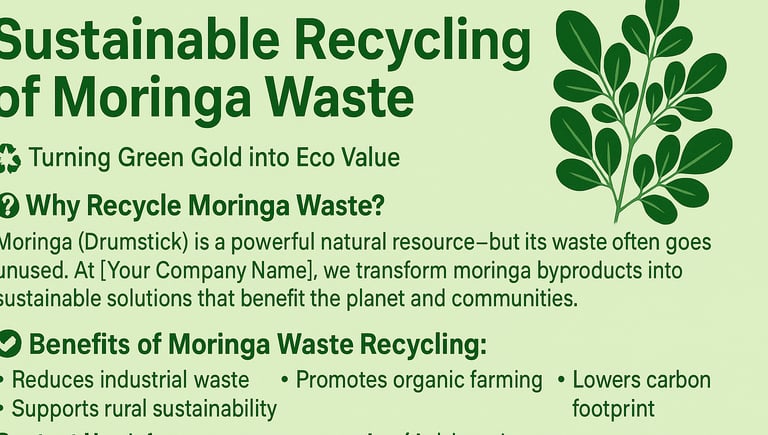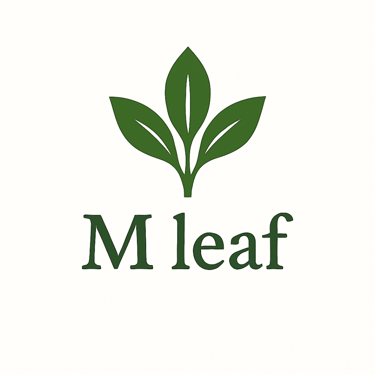Sustainable Recycling Practices at Leafwell "sustainable practices"
Discover how Leafwell Company implements sustainable recycling practices for moringa waste. Learn about our commitment to eco-friendly solutions and innovative methods that promote sustainability in the recycling industry. "sustainable practices"
8/1/20254 min read


Introduction to Moringa and Its Industries
The moringa tree, often referred to as the "drumstick tree," is renowned for its nutritional benefits and versatile applications across various industries. Its leaves, pods, seeds, and flowers are packed with essential vitamins and minerals, making them an integral part of health and wellness sectors. Moringa is utilized in food production, herbal supplements, cosmetics, and even water purification, showcasing its remarkable adaptability and value.
Despite its numerous uses, the harvesting and processing of moringa result in significant waste, primarily the leaves and stems that are discarded after extraction. These parts, often seen as byproducts, contribute to an ecological challenge, particularly in regions where moringa cultivation is prevalent. With the rising demand for moringa products globally, there is an increased concern about the sustainability of traditional practices and the long-term impact of moringa waste on the environment.
The waste generated from moringa processing presents both an ecological and economic dilemma. On one hand, the disposal of these byproducts can lead to soil degradation and negative environmental effects, while on the other hand, the potential for utilizing this waste represents an economic opportunity. Many industries overlook the value of moringa waste, which can serve as a raw material for various applications, including bioenergy production, animal feed, and organic fertilizers. The need for innovative solutions to repurpose moringa waste is becoming increasingly urgent.
As we explore the sustainable recycling practices being implemented by Leafwell Company, it is crucial to understand the broader context of moringa's multiple industries and the importance of transforming waste into valuable resources. By doing so, we can enhance the ecological footprint of moringa production while simultaneously opening new avenues for economic growth.
Understanding Moringa Waste: Types and Potential
The moringa tree, often referred to as the "miracle tree," is known for its incredible health benefits and diverse applications. However, the processing of moringa generates a significant amount of waste, including leaves, stems, pods, and roots. Each of these byproducts possesses unique characteristics and potential uses in various industries.
Firstly, moringa leaves are rich in nutrients and have a high concentration of vitamins and minerals. When processed, these leaves can be dried and powdered to create a nutritious supplement. This powder can be utilized in dietary products or as an ingredient in health foods, thus transforming what would otherwise be waste into a highly valued commodity. The leaves also have potential applications in the cosmetics industry, where their antioxidant properties can be harnessed for skin care products.
Similarly, stems, while often overlooked, can be transformed into biochar or compost. This not only aids in soil improvement but also contributes to sustainable agricultural practices. Using moringa stems in this manner echoes the broader trend of circular economy practices, where waste is minimized, and resources are repurposed efficiently.
Moringa pods, typically discarded after harvest, are another valuable byproduct. They contain seeds that are rich in oil, which has applications in cooking and cosmetics due to its nourishing properties. Furthermore, the seeds can be processed to create natural coagulating agents, benefiting water treatment facilities and offering innovative solutions for clean water access.
Lastly, the roots, often disposed of as waste, contain compounds with medicinal properties. Exploring their potential for use in herbal medicine could lead to new pharmaceutical developments. By recognizing the untapped value of moringa waste, industries can convert these byproducts into beneficial resources, moving toward a more sustainable future.
Leafwell Company's Sustainable Practices
Leafwell Company has established itself as a pioneer in sustainable practices, particularly in the context of recycling moringa waste. Recognizing the vast potential of moringa byproducts, the company has implemented a comprehensive approach that not only minimizes waste but also maximizes environmental benefits. Central to these practices is the process of composting, which allows Leafwell to convert moringa leaf and seed residues into rich organic fertilizer. This compost not only enriches the soil but also significantly reduces the need for chemical fertilizers, thereby promoting healthier agricultural practices.
In addition to composting, Leafwell explores the creation of bioenergy from moringa waste. The company has developed state-of-the-art bio-digesters that convert organic waste into biogas, which can be used for cooking or as a renewable energy source. This method not only helps in waste reduction but also contributes to energy savings, demonstrating an effective solution for sustainable energy generation. Such practices highlight Leafwell's commitment to integrating renewable energy strategies within their operational framework.
Moreover, Leafwell is continually innovating by developing new product lines from moringa byproducts. For instance, the company has created a range of health supplements and beauty products derived from moringa seed oil and extracts, ensuring that every part of the tree is utilized efficiently. These innovative products not only meet consumer demand but also promote the sustainable use of moringa, encouraging circular economy practices. Leafwell’s commitment to sustainability is further exemplified through their partnerships with local farmers, fostering community engagement and support for eco-friendly initiatives.
Real-life case studies have demonstrated the success of these sustainable practices. By effectively recycling moringa waste, Leafwell has significantly reduced its environmental footprint while creating economic opportunities for local communities. This holistic approach to waste management showcases how businesses can lead the way in sustainable practices, ultimately contributing to a greener future.
Benefits of Sustainable Recycling and Future Directions
Sustainable recycling of moringa waste presents numerous benefits that extend beyond mere waste management. One of the primary advantages lies in its positive environmental impact. By effectively repurposing moringa byproducts, companies like Leafwell not only reduce landfill waste but also contribute to lowering greenhouse gas emissions that are often released during waste decomposition. This process promotes a circular economy, which emphasizes reusing materials rather than relying solely on new resources. As the moringa industry grows, adopting sustainable recycling practices will help mitigate environmental degradation while maximizing resource efficiency.
Economically, the sustainable recycling of moringa waste can lead to cost savings and new revenue streams. By converting waste into valuable products such as fertilizers, biofuels, or nutraceuticals, Leafwell Company can enhance its profitability while minimizing operational costs associated with waste disposal. Furthermore, these initiatives can spur job creation, fostering economic growth within local communities. The strategic reuse of moringa byproducts can indeed position companies as innovators in the sustainability sector, attracting socially conscious consumers and investors alike.
Looking ahead, Leafwell Company's commitment to sustainable recycling is anticipated to drive innovation and collaboration within the industry. Potential future directions may include partnerships with research institutions to develop advanced processing techniques or exploring bioengineering innovations to enhance the nutritional properties of moringa byproducts. As the demand for environmentally friendly practices continues to rise, the industry may also benefit from regulatory incentives that support sustainable practices. Through ongoing research and community engagement, Leafwell can lead the charge in establishing comprehensive recycling frameworks that set industry standards for sustainability. In this evolving landscape, the possibilities for expanding the beneficial impacts of moringa waste recycling are limitless.
Wellness
Experience vitality with our natural herbal solutions—crafted to boost immunity, detoxify, and energize. Pure, plant-based wellness for everyday health, rooted in Ayurvedic tradition.
Contact us
support@mleaf.co.in
+91-9911382286
© 2025. All rights reserved.
